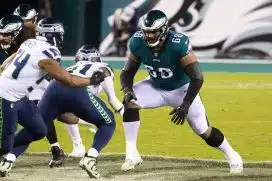By Paul Bowman, Sports Talk Philly Editor
The owners of each NFL team held another meeting Tuesday and passed a rule change for the 2019 NFL season that is sure to have a major impact on the game.
The new rule expands replay review capabilities by allowing teams to challenge phantom pass interference calls, be the defensive or offensive, as well as challenge a pass interference that was not called.
The obvious reason for the change stems from a blatant miss in the NFC Championship game that may have cost the Saints a trip to the Super Bowl had the Rams correctly been charged with a pass interference penalty. Instead, the Rams advanced and had a pitiful showing in Super Bowl LIII, falling to the New England Patriots.
The measure, which would seem to be a common-sense change, did not pass unanimously. The change passed 31-1 with the Cincinnati Bengals being the only team to vote against the change.
The new rules allow for these challenges in the first 28 minutes of each half with the number of challenges unchanged. Within the final two minutes of each half, the calls become booth reviews just as all other challengeable plays.
While not the change that the Eagles originally submitted to rectify the 75-yard touchdown reception Dallas Goedert had called back against the Cowboys because of a phantom offensive pass interference call, the rule would now allow the Eagles to challenge the call and get the play changed back to the 75-yard touchdown it should be.
Here is the video of the offensive pass interference on Dallas Goedert that took away his 75 yard touchdown
— John Clark (@JClarkNBCS) December 10, 2018
The change will almost certainly make it more difficult for cornerbacks and safeties as all of their moves will now be scrutinized on replay reviews. Luckily the Eagles now have deep rooms at both positions that feature six starting-caliber corners and four starting-caliber safeties.
The rule change could also negatively impact physical receivers like Alshon Jeffery who get called for an abnormally high amount of offensive pass interference penalties and still get away with some other possible calls.
It is not yet known how “clear” a play must be to reverse the call or non-call on the field in such a situation.







